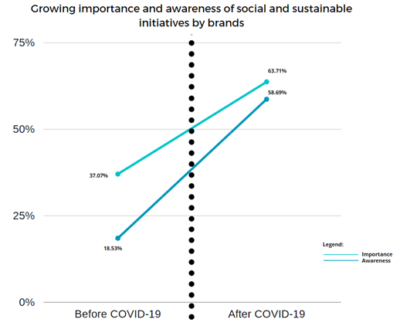The pandemic has slowed down the pace of our lives and this has propelled us towards taking more deliberate actions that has resulted in a more critical assessment of our consumption and our choices. Consumers are now spending more time researching where their products are coming from and how their own consumption is impacting the environment. They are questioning claims made by companies and organisations more critically and are now, more than ever, demanding transparency, accountability, and tangible proof of impact.
COVID-19 is proving to be the wake-up call that we badly needed to take responsibility for our actions, find ways to change how we produce, consume and discard, and in consequence put sustainability at the heart of our decisions.
One of the key drivers for the growing focus on, and recognition of, environmental sustainability during COVID-19 can be attributed to the rise of altruism that has become evident across the world. The pandemic has increased the consumer’s sense of accountability and responsibility for not just for our community, but for the planet and all living things.
A study conducted by our Better Impact team at H+K Singapore shows staggering shifts in the younger generation’s demand for brands to act more sustainably and to provide more affordable and accessible alternatives to products and services. Over the past 10 months, we have observed an increase of over 26% in consumers who deem brands’ sustainability initiatives very important to their purchasing decisions, triggered by a 40% increase in awareness of brands’ promises and actions.

“Over 60% of the population surveyed in Southeast Asia said they are actively choosing to do away with products that do not have a strong and believable sustainability claim, and as awareness is growing along with interest; transparency and trust are becoming the key determining factors.”
This level of an attitudinal shift in such a short period of time clearly indicates a trend where brands which do not provide credible and tangible sustainable solutions will quickly become the losers of the new economy.
The pressure for purpose is increasing in Asia
With growing awareness, knowledge, and interest around the real impact of production and consumption, enlightened self-interest is on the rise in Asia. Brands in this region, previously less concerned with their CSR initiatives and the role of sustainability in their business model, are starting to feel the pressure from their consumers to behave more sustainably and to provide evidence for their claims.
Combine this pressure with the increase in regulations and ESG reporting becoming mandatory, and the need to change business models to actively provide sustainable and ethical solutions now has become a question of survival.
One of the main ways we see this manifest itself is through more sophisticated collaborations with NGOs. Companies choosing to simply sponsor a well-known NGO for the purpose of PR and stakeholder management is no longer enough, and we are seeing a growing focus on brands looking for organisations who can actively help them offset some of their negative footprint and support parts of their supply chain in becoming more sustainable.
Heineken Malaysia’s partnership with SPARK foundation’s W.A.T.E.R Project is a strong example of a brand actively working for a sustainable circular economy – improving their operations by balancing the water they use for production with investment in water generation, conservation, access and stewardship.
H+K’s sustainability platform, Project Impact is designed to facilitate and enable such collaborations for better, matching brands with NGOs in the region who are actively addressing issues directly linked to the brands’ business model. This allows us to support companies to improve their operations, offset negative footprint and support local communities, local wildlife, and nature conservation quickly and effectively.
Project Impact acts as a catalyst for change, and together with the expertise at H+K across purpose strategy, partnership programs, impact reporting and communication, it enables companies to pivot and adjust their model to deliver more effectively on a triple bottom line.
Never has it been more important to act with purpose and never has the opportunity to change been greater.
An opportunity to take stock and change for better
COVID-19 has forced change in critical areas for sustainability, highlighted by positive shifts in consumption and growing interest and engagement in social and environmental initiatives. It has revealed an opportunity for brands to build disruptive, targeted, and tangible CSR strategies into their growth plan, to address a new normal and occupy new white space territories for a long-term, sustainable competitive advantage.
This is the momentum we need to ensure these forced disruptions result in lasting changes and long-term positive impact. It should be seen as a great opportunity for companies and organisations to take stock, assess where the opportunities for improved sustainable innovations and operations lie and then develop strategies and models for their business that can deliver on these goals for the future.
The ones who act and act fast will come out of this as the new leaders of a more conscious and altruistic global society.
This article was first published on PRWeek.